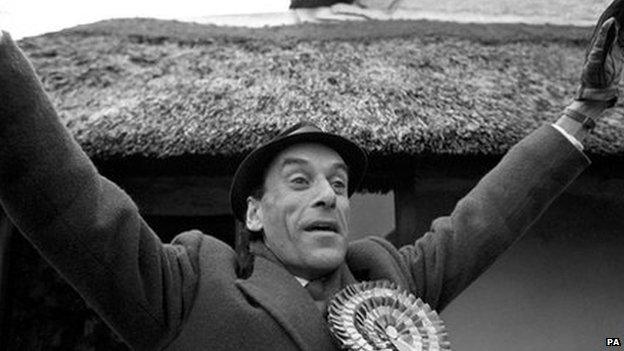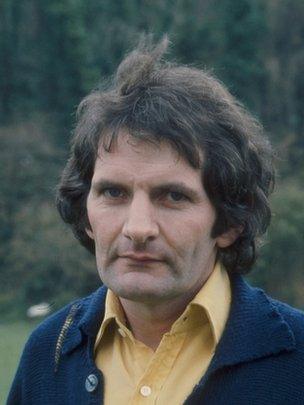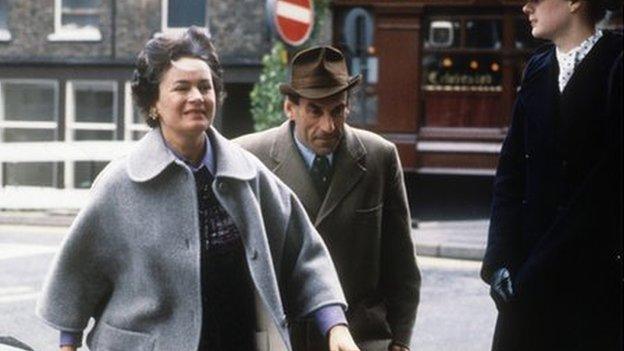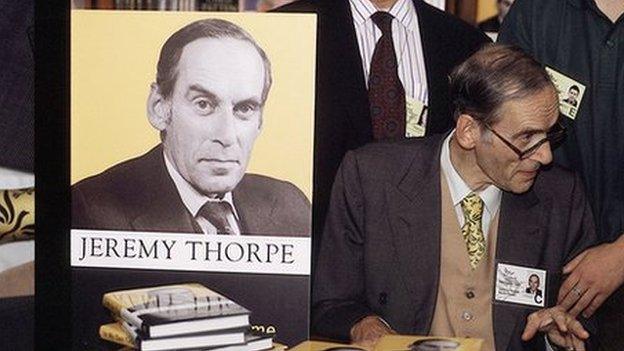Obituary: Jeremy Thorpe
- Published
James Landale looks back at the life of Jeremy Thorpe
Jeremy Thorpe, who has died aged 85 after a long battle with Parkinson's Disease, led the Liberal Party with flair and flamboyance.
His energetic campaigning and powerful oratory attracted many voters and he came close to achieving a share of government for his party.
Under his leadership, the Liberals looked to be regaining their position as a strong force in British politics.
But his political career ended when his life was engulfed in scandal and he faced trial on charges of conspiracy and incitement to murder.
John Jeremy Thorpe was born in Surrey on 29 April 1929.
He came from a Conservative family - both his father and grandfather were Tory MPs. One of his ancestors was parliamentary Speaker Thomas Thorpe, who was beheaded by a mob in 1461.
Election success
He was sent to a school in Connecticut in 1940 to escape the Blitz.
One historian has suggested that the liberal regime at his American school played a large part in formulating his political thinking and was, no doubt, a huge contrast to Eton where he went from 1943.
He read law at Trinity College, Oxford where he cut a dash, both by wearing Edwardian-style clothes and as a noted debater. He became chairman of the Liberal Club and then the Oxford Union.

Acknowledging his supporters in the 1974 election
While training as a barrister he set out to find a parliamentary seat and was selected for Conservative-held North Devon, firmly in the west country Liberal heartland.
His energetic campaigning, and inspiring performances as an orator saw him halve the Conservative majority in the 1955 general election.
Just four years later, he won the seat by the narrowest of margins, a rare Liberal triumph in what had been a poor election showing for the party elsewhere in the country.
Conference favourite
He entered the 1960s as a pioneering campaigner for human rights, attacking South Africa's policy of apartheid and the post-colonial excesses in South East Asia.
He also achieved a reputation as something of a wit exemplified by his observation on Harold Macmillan's dismissal of a third of the Conservative cabinet in 1962.
"Greater love hath no man than this," quipped Thorpe, "that he lay down his friends for his life".
He became a favourite at Liberal party conferences and served as the party's treasurer before being elected leader in 1967 promising to turn the Liberals into a radical pioneering force.

Norman Scott claimed a sexual relationship with Thorpe
However Edward Heath's win in the 1970 general election dashed hopes of a Liberal revival and shortly after it Thorpe's young wife Caroline was killed in a car crash.
Three years later he married Marion Stein, a noted concert pianist and the divorced wife of the Queen's first cousin, the Earl of Harewood.
Helped by Thorpe's elegant appearance and charismatic style, the Liberals won 14 seats in the February 1974 election.
With a hung parliament, Conservative leader, Edward Heath, approached Thorpe to discuss a possible coalition.
Thorpe was attracted by the offer of a seat in Cabinet, but met opposition from his own MPs.
Denial
In the event, Harold Wilson's clear victory in the October 1974 election ended any hopes that the Liberals might have a share of power.
Within two years, stories were circulating about Thorpe's relationship with a former male model, Norman Scott.
It was made worse because the relationship was alleged to have started in 1961, when male homosexual acts were illegal.
The story broke when Scott was appearing at a court in Barnstaple on a minor social security charge.
During the hearing, Scott shouted out, "I am being hounded because of my sexual relationship with Jeremy Thorpe." He gave a statement to the police but no action was taken.
Trial
Thorpe issued an immediate denial but when an affectionate letter between them appeared in the press, Thorpe resigned as leader.
But worse was to come. Eighteen months later, a man called Andrew Newton was released from prison.
He had been jailed on charges arising from an incident on Exmoor in which Norman Scott's dog, Rinka, was shot.
He claimed that he had been paid by a leading Liberal supporter to kill Scott because of his blackmail threats but said he had lost his nerve and shot the dog instead.

Arriving at the Old Bailey in 1979 with wife Marion
Nine more months of police investigation led to Thorpe and three associates being charged with conspiring to murder Scott.
The 1979 trial was postponed for eight days at Thorpe's request so that he could contest his North Devon seat in the May general election. He was heavily defeated.
The trial attracted reporters from all over the world. It took 20 days for the prosecution to present its case to the jury while defence evidence occupied just a single day.
Amnesty International
On the advice of his barrister, George Carman QC, Thorpe and his co-defendants elected not to go into the witness box.
Eventually, after six weeks, the charges were dismissed. For two years Jeremy Thorpe stayed out of the public eye.
But the affair resurfaced again when one of his co-defendants, David Holmes, a former deputy treasurer of the Liberal Party, wrote a series of articles for the News of the World newspaper.
In the first of them he claimed that Thorpe did incite him to murder Norman Scott. Thorpe's solicitor immediately issued a rebuttal and the director of public prosecutions said there was no question of another trial.

At a book signing in 1999
But Thorpe's public life was finished.
Shortly after his acquittal he was offered the post of director general of the British section of Amnesty International.
He had previously been a valuable source of information to the organisation, particularly on the subject of human rights abuses in Ghana.
But there was huge opposition from Amnesty's members and the appointment was never made.
His later years saw the onset of Parkinson's Disease. But he kept in close touch with the Westminster he loved, despite painful memories.
He became the President of the North Devon Liberal Association, later Liberal Democrat Association, and received a standing ovation when he appeared at the 1997 Liberal Democrat conference.
In an interview in 2009 the ailing former politician reflected on the events that had brought him down
"If it happened now," he said, " I think the public would be kinder."